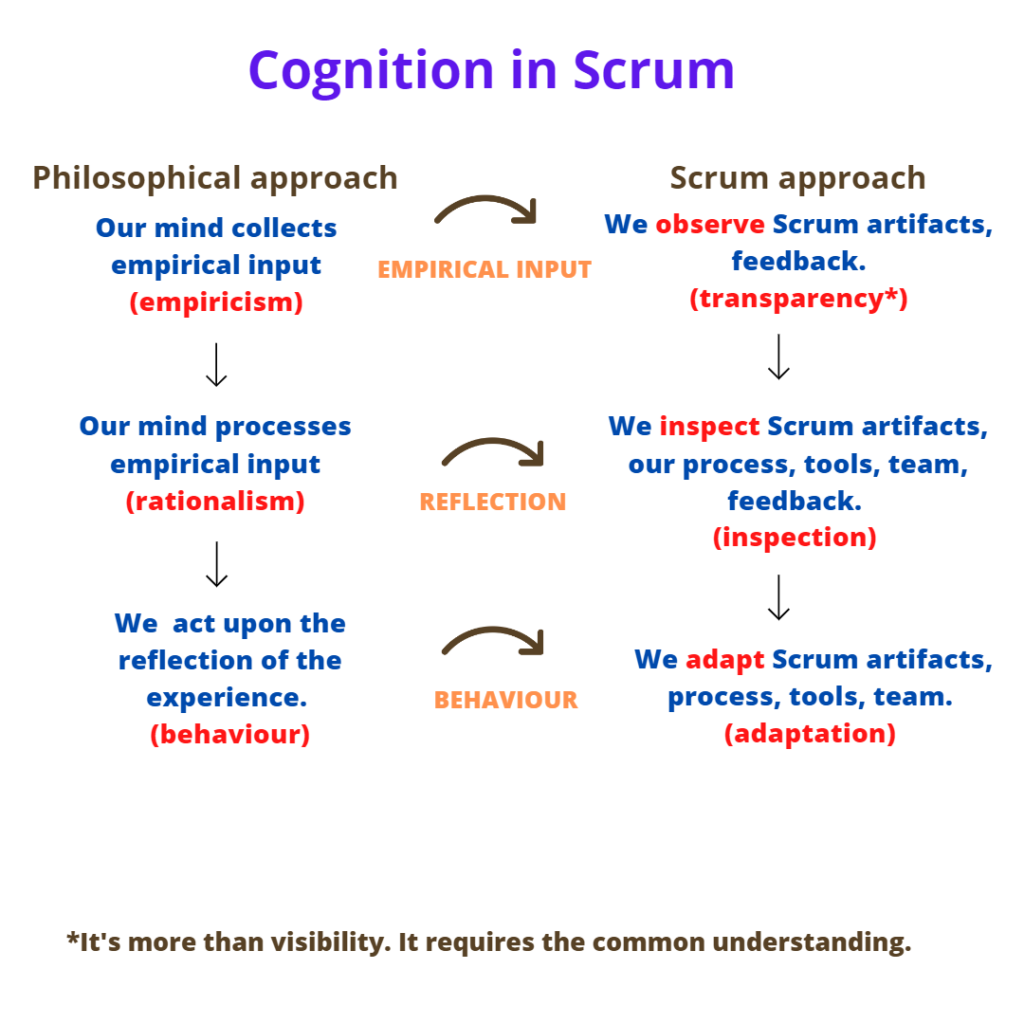Where does our knowledge stem from?
Before we go on to Scrum empiricism, we focus on cognition. It’s a process of knowledge processing by our mind. Everything starts with experience. Our life experience is everything that gets inside our mind (empiricism): any empirical sensation, that is, perceptions, feelings, emotions. Material perceptions have their mental representations, on which the mind reflects (rationalism). On that basis thinking habits are created that ties in closely with our acting. We act upon the empirical data. This gives rise to behavioral habits. The pattern would go as follows:
- We experience something. (we see, hear etc.) Empiricism
- We reflect on that experience. Rationalism Thinking habits are formed.
- We act upon that reflection. Behaviour Behavioural habits are formed.
- The process repeats itself.
By reflection I mean any mental operation of our sensory input called experience. John Locke, an English philosopher and thinker, told: “there is nothing in the mind that was not first in the senses.” Bearing all of this in mind, I will make an attempt to explain Scrum knowledge acquisition.
The human mind and change
It’s not us, it’s our brain that fears change. It’s the natural ability of our mind to gather classify and categorize our life experiences. The mind does so in order to save the energy our body needs. Can you imagine doing everyday activities while constantly analyzing what you’re doing? That might lead to mental exhaustion or drive you crazy. Your brain is doing you a favour.
Why does change trigger insecurity?
It’s a defensive mechanism of our brain, and is a natural response. Why is that? Change is tough on us, as it means uncertainty: we don’t know what’s going to happen since it’s a NEW experience. “New” means unknown, uncertain.
Scrum Empiricism and change
Heraclitus, the ancient philosopher, is famous for his approach to change. He said change was the only thing one could be sure to permanently occur. Change might involve us, others or the outside world. The way I see it, life consists of single events that might take place in infinite configurations. It’s like a LEGO house whose every piece refers to a single experience. In this respect, all our life seems to be dealing with change. The world has always been like that. The VUCA concept only stressed that. Depending on the area it involves, there are a number of ways that change might be understood. Scrum is a change-optimizing mechanism. It’s a framework for complex domain of work. In other areas, it might not make any sense. The Scrum Events are there for change to occur. Change takes place on the basis of what we can observe (empiricism – the experience). Then we reflect (rationalism) on what we can see (the tangible product) and hear (the feedback from the users) and adapt new solutions.
What’s the most difficult about change?
The hardest is to kick out thinking patterns determined by our life experience, beliefs, knowledge. Agile is people-driven. Changing the terminology, introducing the events, three accountabilities isn’t enough to be successful without the shift in thinking. It’s like speaking English while thinking in Polish. You’re mostly understood, but still sounds really odd.
How to implement change?
No silver bullet. From my experience, change is a small modification/alteration of what we already have in place. That means we have some standards, read-to-use solutions. Their contant improvement is what I call change. First I try to figure out the process we have. I perceive it as a system. Then the planning is done. The smaller the modification is, the better for those involved. I don’t even have to use the word change. It’s better to say “improve”, “implement” or any other word. Oftentimes it just comes naturally when you work with guys who trust and respect you. The change is made upon the knowledge that is validated. All of this is reflected in Product Backlog.
Scrum empiricism and knowledge acquisition
